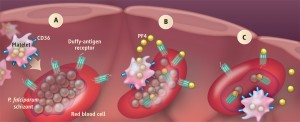From Science magazine this week, a report on how platelets express genes to help kill parasites. An excerpt from the perspective:
The six Plasmodium parasite species that cause disease in humans (P. falciparum, P. vivax, P. malariae, P. ovale wallickerie, P. ovale curtisii, and P. knowlesi) appear to have independently colonized hominids and influenced the genetic composition of different human populations (3). For example, the genes responsible for sickle cell anemia, thalassemia, and glucose-6-phosphate dehydrogenase deficiency have a higher frequency in populations where malaria is, or was once, endemic. These genes provide protection against severe malaria syndromes and likely evolved in response to the disease by providing a survival advantage (4). Another of these genes encodes the Duffy-antigen receptor for chemokines (DARC/Fy glycoprotein/CD234) found on red blood cells. This protein also acts as a receptor for P. vivax (5), and human red blood cells lacking this receptor are resistant to invasion by this species and by P. knowlesi (6, 7). The impact of this genetic selection can be seen in the geographical distribution of P. vivax. This parasite is spread throughout tropical regions of the world, but is rare in large areas of central and western Africa where many individuals lack Duffy-antigen receptor expression on red blood cells. Thus, this “Duffy-negative” phenotype appears to have evolved as an innate resistance mechanism to P. vivax infection.
McMorran et al. extend previous work that demonstrated an important role for platelets in resistance to malaria (8) by identifying platelet factor 4 (PF4) as a key molecule in platelet-mediated killing of P. falciparum. PF4 is released from α granules in activated platelets to promote blood coagulation (9). It binds the Duffy-antigen receptor, along with several other chemokines (10). McMorran et al. found that a functional Duffy-antigen receptor is required for the antiparasitic activity of PF4.
Also check out the scientific research paper here [subscription required].

Comments are closed.